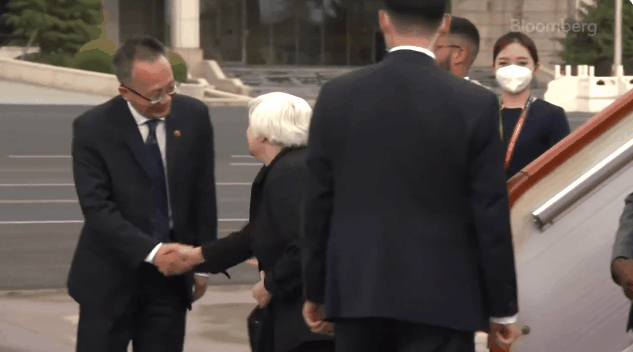On her second day of a four-day mission to repair strained ties with a formidable global competitor, Yellen was seen bending at the waist at least three times while greeting Vice Premier He Lifeng, according to video footage.
On the other side, He, who is an influential figure in Xi Jinping’s economic circle, remained upright, taking a step back to accommodate Yellen’s misplaced courtesies.
Bradley Blakeman, who served as a senior staffer in George W. Bush’s White House, was direct in his critique.
He said to The Post, “An American official does not bow. It looks like she’s been summoned to the principal’s office, and that’s exactly the optics the Chinese love.”
Jerome A. Cohen, an emeritus professor at NYU and a scholar of Chinese law and government, concurred, “Bowing is not part of the accepted protocol.”
Compounding the perceived errors, Yellen, 76, mispronounced He’s name during the initial session of the American officials’ meeting with the economic head honcho, referring to him erroneously as “Vice Premier Hu.”
In her opening remarks, Yellen stated, “I strongly believe that the relationship between our two countries is rooted in the solid ties between the American and Chinese people. It is important that we keep nurturing and deepening these ties.”
During her Beijing visit, Yellen advocated for China, the world’s largest carbon emitter, to roll back its greenhouse gas emissions in an effort to mitigate climate change. “We have a duty to both our own countries and to other countries to cooperate” on environmental issues, she asserted.
Yellen also made an appeal for the establishment of a “healthy economic competition that is not winner-take-all.”
She proclaimed, “Where we have concerns about specific economic practices, we should and will communicate them directly.”Ironically, just days before Yellen’s arrival, China declared new export restrictions on gallium and germanium, metals that are essential for semiconductor production, claiming the necessity to “safeguard national security and interests.”
This action was broadly interpreted as a countermove against American restrictions on Chinese tech.
Furthermore, shortly after Yellen’s arrival in Beijing, China escalated tensions with Taiwan, sending 13 People’s Liberation Army aircraft and six vessels into the airspace and waters surrounding the sovereign island democracy, which the CCP views as part of its territory.
Bradley Blakeman voiced his critique, “The way to treat an adversary is, you don’t go hat in hand. But with this administration, time and time again, we embarrass ourselves and show weakness. And it just shows the lack of...
During her Beijing visit, Yellen advocated for China, the world’s largest carbon emitter, to roll back its greenhouse gas emissions in an effort to mitigate climate change. “We have a duty to both our own countries and to other countries to cooperate” on environmental issues, she asserted.
Yellen also made an appeal for the establishment of a “healthy economic competition that is not winner-take-all.”
She proclaimed, “Where we have concerns about specific economic practices, we should and will communicate them directly.”Ironically, just days before Yellen’s arrival, China declared new export restrictions on gallium and germanium, metals that are essential for semiconductor production, claiming the necessity to “safeguard national security and interests.”
This action was broadly interpreted as a countermove against American restrictions on Chinese tech.
Furthermore, shortly after Yellen’s arrival in Beijing, China escalated tensions with Taiwan, sending 13 People’s Liberation Army aircraft and six vessels into the airspace and waters surrounding the sovereign island democracy, which the CCP views as part of its territory.
Bradley Blakeman voiced his critique, “The way to treat an adversary is, you don’t go hat in hand. But with this administration, time and time again, we embarrass ourselves and show weakness. And it just shows the lack of...



























